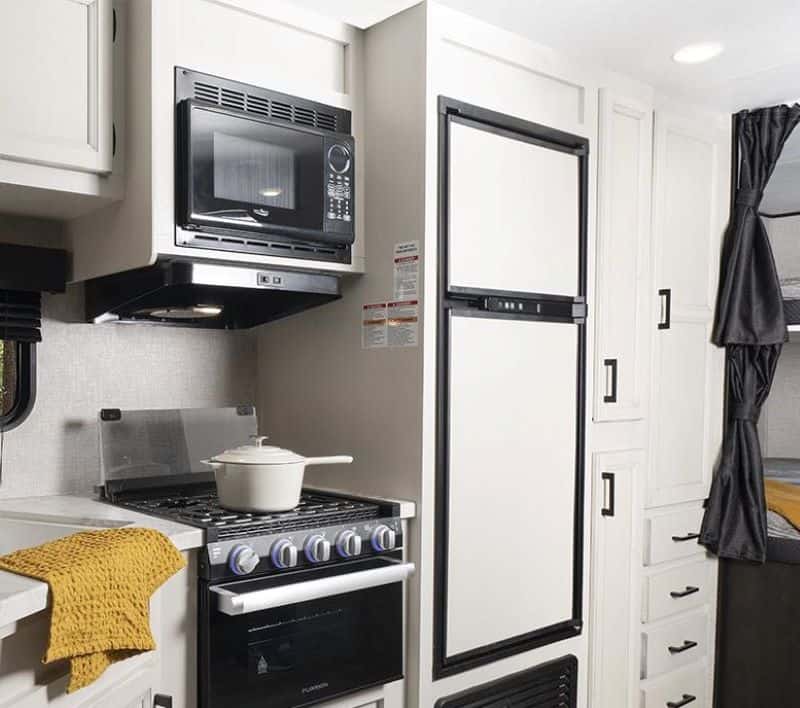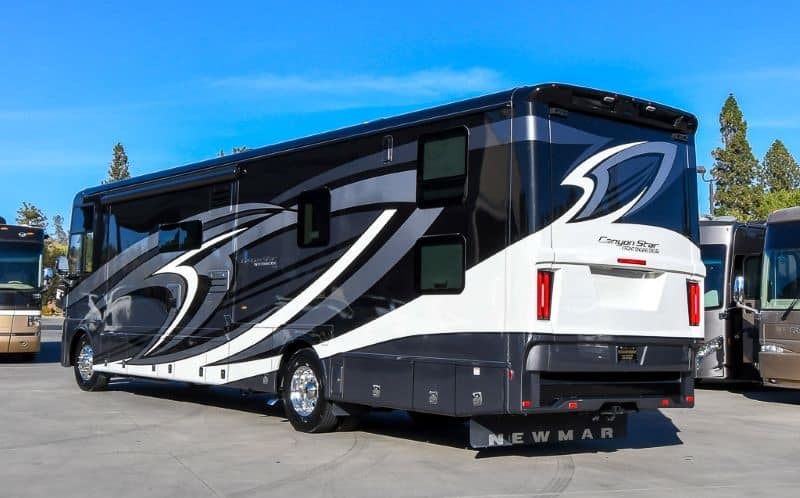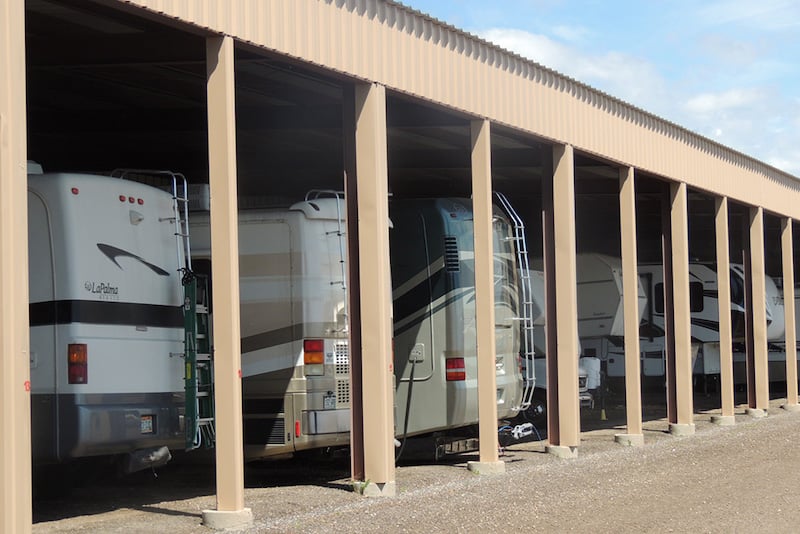An RV refrigerator is an entirely different animal from the one in your home because the power supply is inadequate for a standard home fridge. So, people wonder, does an RV fridge work better on gas or electric and other related matters.
3-way gas-electric refrigerators used to be the go-to option, but now electric RV compressor refrigerators dominate the industry. However, a gas fridge still has its benefits due to the lack of moving parts, they tend to last longer, and they’re favored for boondocking.
However, electric fridges are installed on newly manufactured RVs with increasing frequency, mainly because the technology is improving. As solar panels, inverters, and clean energy power sources become more prevalent, it only makes sense that electric fridges and 2-way AC/DC fridges play a larger role.
Join us as we explore whether as we explore if an RV fridge will work better on gas or electric.
What is an RV Fridge?
The biggest difference between RV and residential refrigerators is their power supplies and sizes. An RV fridge draws power from the RV’s 12V battery supply, propane, or shore power. In addition, RV refrigerators use what is called “absorption” to achieve their cold temperatures rather than a compressor.
An RV absorption fridge requires a heating source (yes, that sounds a bit weird), which is powered by electricity and propane gas. Either way, the heat source is applied to an ammonia refrigerant, boiling it off and transforming it into its gaseous state. That gas is then converted into a liquid, creating a cooling effect.
As this back-and-forth cycle goes on, the ammonia travels through the condenser pipes, where the heat is pulled from the inside the refrigerator before returning to a liquid state. In the meantime, the same thing occurs with the hydrogen molecules from the original liquid.
When these elements return to a liquid state, they are much colder than they were originally. This constant back and forth between gas and liquid transformation is the process that causes an RV refrigerator to cool inside.
Eventually, after passing through the evaporator coils and several absorption chambers, everything returns to exactly where it started, and the whole cycle repeats in an endless loop. It’s complicated. But the point is that RV refrigerators don’t require that surge of power necessary to kick on the compressor.
4 Ways to Determine if an RV Fridge Works Better on Gas or Electric
There are two things an RV fridge needs to work (well, two primary things, anyway). First, you need a heat source, whether that’s an electrical or gas supply, and you need airflow.
1. Cooling Speed
Electric fridges begin cooling instantly, while gas fridges take some time to cycle up and get going. However, gas fridges reach the end of the cooling stage faster. It just takes them longer from the beginning.
2. Efficiency
From an efficiency point of view only, when comparing which RV fridge works better, gas or electric, a propane fridge is more efficient than an electric fridge. It can run a reasonable amount of time on a 20 lb tank and doesn’t require much maintenance. However, gas fridges are highly susceptible to temperatures. In sweltering climates, they have a harder time maintaining temperatures.
3. Reliability
Gas fridges are more reliable than electric fridges because they function with fewer components. Any time you start getting rid of the complexity of various electrical components, reliability improves. There are too many things on an electric fridge that can potentially fail
4. Safety
Electric fridges rule the roost on safety. Not only is electricity safer than gas, but electric fridges are often manufactured with far more safety features than gas fridges.
Pros of an RV Fridge Running on Gas
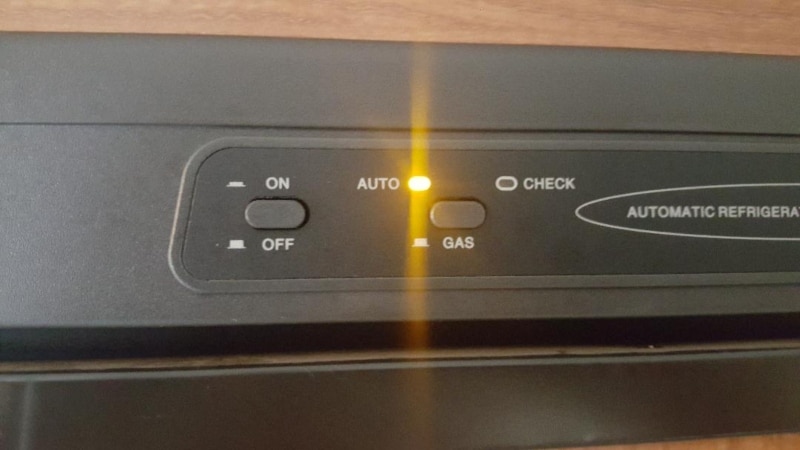
Portability is the name of the game when running a gas refrigerator. Sure, you have 12V batteries, but those things need to be topped off, and even an absorption fridge will chew through a 12V quicker than most of the other appliances in your RV.
A 20 lb propane tank will last surprisingly long on a moderate-size RV fridge. They work well with various batteries too. Although they tend to start slow in the cooling process, they rapidly speed up and reach minimum temperature faster than electric fridges.
If expense is an issue, gas refrigerators are the cheaper alternative, though that price point is often buried in the overall cost of the RV.
Cons of an RV Fridge Running on Gas
Gas RV refrigerators are more prone to serious reductions in efficiency when they are off balance. The worse the balance, the worse the dysfunction. There’s also a small safety factor to keep in mind.
Temperature, outside and inside, has a stronger effect on gas fridges, especially if you have exterior propane tanks. So when you consider which RV fridge will work better, gas or electric, you have to factor in the gas lines. While that’s not too much of a problem, they tend to get inflexible with age and need to be replaced after a handful of RV seasons.
A surprisingly negative factor is the battery. Gas-powered refrigerators still require a 12V battery to function, and they tend to eat through those batteries in a hurry.
Pros of an RV Fridge Running on Electric
The first positive that stands out with electric fridges is the diverse number of types available on the market. It’s not just a matter of variety but also the many stand-out features that come with them. If you like to have a lot of choices, electric fridges scratch that itch.
Electric fridges also feature numerous safety features, and they start cooling immediately, so you can add food as soon as possible. Though they are higher maintenance appliances than gas fridges, they’re still generally simple to work on.
Cons of an RV Running on Electric
Though gas refrigerators lean on 12V batteries more than most would prefer, electric fridges dominate in this arena. You need solar backup, generators, or reserve battery banks to keep one of these puppies running day and night.
Also, for some odd reason or another, electric fridges are more difficult to get the temperature just right. As a result, they tend to be a little quirkier for those who want to control the internal temperature.
What Factors Affect How Well an RV Refrigerator Works?
When comparing which types of RV fridges work better, gas or electric, we’ve covered some of these factors above but in a sort of dispersed manner. Several factors affect RV refrigerators. Unfortunately, most of these factors have a negative effect.
- How level is the fridge
- The interior temperature
- The exterior temperature
- Adequate airflow
- Elevation
- Amount of food packed into the fridge
Although you will get away with placing a box fan on the floor and circulating air behind the fridge, you could pick up a small fan inside the refrigerator to do this more consistently. Airflow is essential if you are in a hot climate; that fan is a lifesaver. Before you do this, look through the owner’s manual and ensure the manufacturer doesn’t specifically tell you not to do this.
This leads us to our next point concerning temperature. Absorption fridges use components to heat and cool the hydrogen and ammonia mixture rapidly. Internal and external temperatures play havoc on a fridge’s ability to do that. Propane is especially affected by frigid temperatures when your tanks are outside.
Believe it or not, elevation plays a role as well. The boiling temperature of propane rises the higher you go above sea level. You must also keep your RV as level as possible, regardless of elevation. So if you are camping on top of the Colorado Rockies, your gas-electric fridge could have difficulty using the propane boiler system to keep the refrigerator cool.
Gas fridges are more susceptible to an unlevel setting, affecting electric absorption fridges as well. Another thing that affects a gas fridge more than an electric one is how much you pack inside.
Most RVers start the cooling process overnight on their gas fridges, allowing the temperature to cool before loading the fridge with food. You can load it up sooner in an electric, but if you pack it heavily, it will slow down the cooling process.
7 FAQs About RV Fridges on Gas or Electric Power
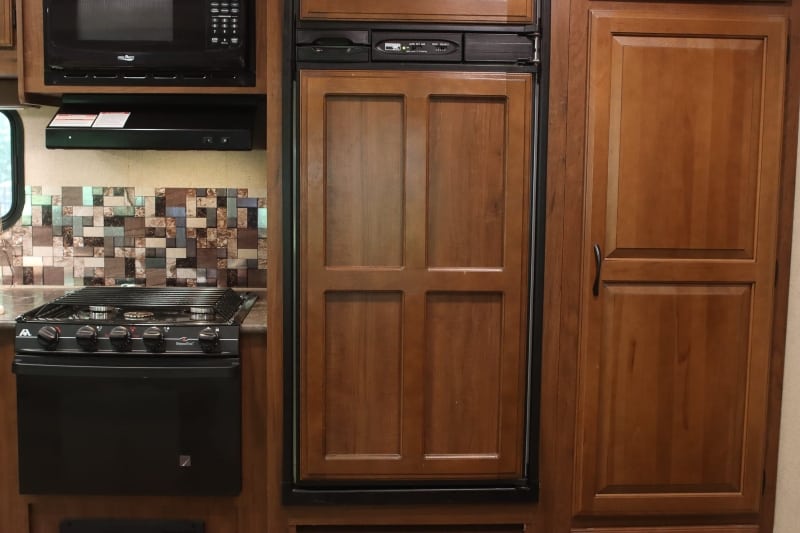
1. How long will a 20 lb propane tank run an RV refrigerator?
Keep in mind these are general terms. The larger the refrigerator, the more it eats into a propane tank’s limits. On average, a 20 lb propane tank will run an RV refrigerator for over 11 days, and a 30 lb pushes it toward 18 days.
2. Can you keep your RV fridge running while driving?
You can keep the RV fridge running while driving, and many RVers do it. However, some risks are also associated with this, mostly with propane fridges.
- Potential for a break in a propane line
- Line twisting
- Any kind of spark created while moving is dangerous
- Broken lines can cause explosions
- Bridges and tunnels may require you to turn the propane off due to the fire/explosion risk.
3. How do I keep my RV fridge cold while driving?
One of the best ways to keep your RV fridge cold while driving is to pack ice in the fridge before you head out. You can also lower the temperature before you leave, which will hold the cool temperature for a surprisingly long time while on the road. It also helps only to pack it with refrigerated or frozen items before you drive.
4. Can an RV fridge run on battery while driving?
RV fridges can run on the battery while driving, but you need to be sure your drive time won’t exceed three hours. It depends on the size of the refrigerator. The better option is to run it on an RV generator or propane if you cannot use the house batteries for the length of the trip.
5. How long will a 12V battery run an RV refrigerator?
The length of time a 12v battery will run an RV refrigerator largely depends on the size of the fridge. Something tiny, like a 2 cubic foot fridge, will run for quite a while, much longer than a day trip. The larger the fridge is, the shorter the time frame. The battery also matters, depending on the number of amp-hours the battery features.
6. How long will a 3-way fridge run on gas?
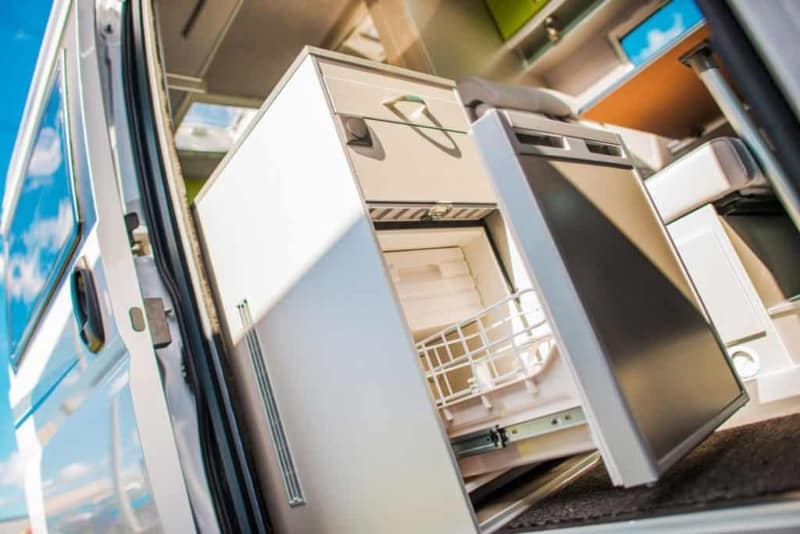
For a three-way fridge, a 20-lb propane tank will run it for a long time. At the very least, well over a week. Every fridge is different, and there is some variance in how long they will run on a propane tank.
7. How long will an RV refrigerator stay cold without power?
RV fridges will stay cold without power for at least half a day (12 hours) since they are well insulated. After 12 hours, you might want to be wary of biting into that fresh grocery store sushi.
About the Author:
Thomas Godwin is a full-time freelance writer with a BFA in Creative Writing, a U.S. Marine, and an avid outdoorsman.
When he’s not writing, he’s raising chickens and Appleyard ducks. Thomas also constructs teardrop campers (attempting to anyway) and kayaks the Blackwater River with his wife, two daughters, and his Dobermans.


